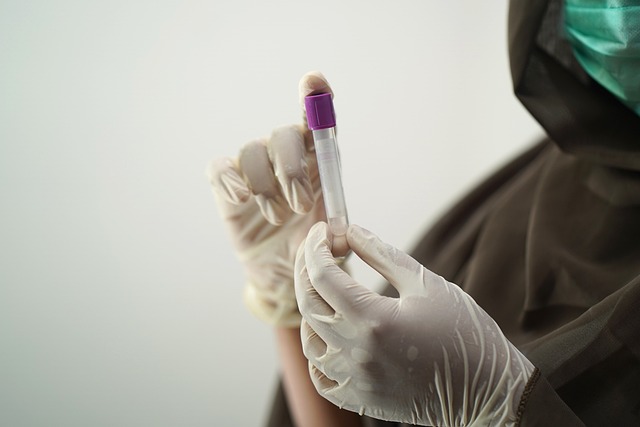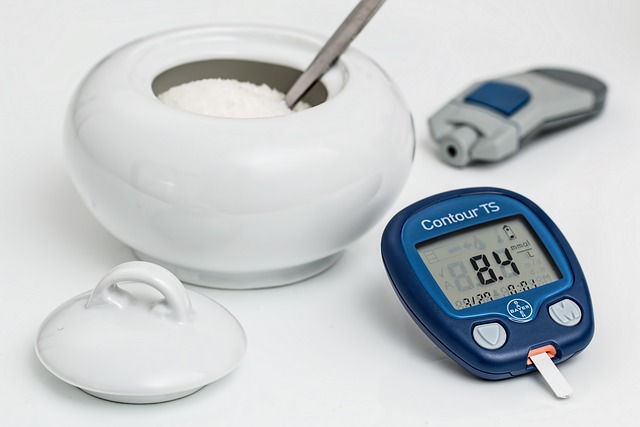The 'sunshine vitamin,' Vitamin D, is integral for bone health, immune system robustness, and mental well-being. It's produced in the skin through sunlight exposure or obtained from dietary sources like fatty fish and fortified foods. Regular monitoring of Vitamin D levels via a Standard Liver Blood Test UK is crucial, especially in the UK's variable climate. This test not only checks liver health but also provides insights into Vitamin D status, which is vital for preventing diseases such as osteomalacia, certain cancers, cardiovascular disease, and respiratory infections. The Standard Liver Blood Test UK includes measurements of liver enzymes, proteins, bilirubin levels, and enzymes like GGT, ALT, and AST, with elevated GGT potentially indicating Vitamin D insufficiency. Abnormal test results can point to various health issues, including conditions associated with low Vitamin D, allowing for early detection and personalized treatment plans that focus on improving overall health and wellness. The Standard Liver Blood Test UK offers a comprehensive health assessment tool that includes liver function tests and Vitamin D measurement, making it a vital diagnostic method for maintaining health in the UK.
Vitamin D, often heralded as the ‘sunshine vitamin,’ plays a pivotal role in our health, influencing everything from bone density to immune function. A standard liver blood test in the UK can offer insights not only into liver health but also into an individual’s Vitamin D status. This article delves into the significance of Vitamin D for overall wellness and underscores the importance of regular testing to maintain optimal levels. By understanding its multifaceted impact on health and how it is reflected in a routine blood test, individuals can take proactive steps towards ensuring their well-being.
- Understanding the Role of Vitamin D in Health: A Comprehensive Guide
- The Importance of Vitamin D Levels Testing for Overall Wellness
- How a Standard Liver Blood Test UK Can Indicate Vitamin D Status and Beyond
Understanding the Role of Vitamin D in Health: A Comprehensive Guide

Vitamin D, often referred to as the ‘sunshine vitamin’, plays a pivotal role in maintaining overall health and wellness. It is naturally produced in the skin upon exposure to sunlight and is also obtained through dietary sources such as fatty fish and fortified foods. Beyond its well-known role in calcium metabolism, supporting bone health, and preventing osteomalacia, Vitamin D has a broader impact on human physiology. It influences gene expression in ways that can affect nearly every cell in the body, influencing immune function, cardiovascular health, and even mental well-being. Adequate levels of Vitamin D are crucial for a robust immune system, with studies suggesting its deficiency may be associated with an increased susceptibility to infectious diseases. Additionally, maintaining optimal vitamin D levels is linked to a lower risk of developing certain cancers, multiple sclerosis, and type 2 diabetes. Regular testing of Vitamin D levels, which can be done through a standard liver blood test in the UK, such as the ‘Standard Liver Blood Test UK’, ensures that individuals can maintain these optimal levels and address any deficiencies proactively. This is particularly important for those with limited sun exposure or certain health conditions that affect fat absorption, which are necessary for Vitamin D to be effectively utilised by the body. Understanding one’s Vitamin D status is integral to comprehensive health assessments and can contribute significantly to disease prevention and overall wellness management.
The Importance of Vitamin D Levels Testing for Overall Wellness

Regular testing of vitamin D levels is a critical component in maintaining overall wellness, particularly for individuals residing in the UK where sunlight exposure may be limited due to the climate. Adequate vitamin D, often referred to as the ‘sunshine vitamin,’ plays an integral role in bone health, immune function, and even mental well-being. It is pivotal for the absorption of calcium and phosphorus, which are essential for strong bones and teeth. The Standard Liver Blood Test UK frequently includes vitamin D measurement, offering a convenient opportunity to assess one’s levels. This comprehensive test not only provides insights into liver function but also offers a snapshot of an individual’s vitamin D status, which can be indicative of broader health issues.
Insufficient vitamin D levels have been linked to a myriad of health concerns, including osteomalacia and increased risk of certain cancers, cardiovascular disease, and even respiratory infections. By identifying vitamin D deficiencies early through regular testing, healthcare providers can tailor dietary or lifestyle interventions to improve overall wellness. For those who spend significant time indoors, have darker skin, or live in regions with less sunshine, the risk of vitamin D deficiency is heightened. Therefore, understanding one’s vitamin D levels through a test like the Standard Liver Blood Test UK can be instrumental in implementing preventative health measures and promoting long-term wellness.
How a Standard Liver Blood Test UK Can Indicate Vitamin D Status and Beyond

A Standard Liver Blood Test UK serves as a multifaceted health indicator, including insights into an individual’s Vitamin D status. This test, which measures liver enzymes and proteins such as albumin and globulin, along with bilirubin levels, gamma-glutamyl transferase (GGT), alanine aminotransferase (ALT), and aspartate aminotransferase (AST), can subtly reflect Vitamin D metabolism. For instance, elevated GGT levels may suggest inadequate Vitamin D levels, as this enzyme is also involved in the synthesis of vitamin D metabolites. Similarly, abnormalities in liver function tests can be indicative of conditions that are linked to low Vitamin D, such as liver cirrhosis or chronic hepatitis C, both of which have been associated with vitamin D deficiency. Beyond its role in liver health assessment, the Standard Liver Blood Test UK’s comprehensive nature allows healthcare professionals to detect a myriad of other health issues, providing a broader overview of an individual’s wellness that encompasses Vitamin D status. This holistic approach to health evaluation ensures that any anomalies in the test results can be investigated further, leading to personalised treatment plans and lifestyle adjustments that could enhance overall well-being and address potential Vitamin D deficiencies effectively.
Regular monitoring of vitamin D levels through a standard liver blood test in the UK is a prudent step for maintaining overall health. As detailed in this article, understanding the critical role vitamin D plays in bone health, immune function, and even mental wellbeing underscores the importance of ensuring adequate levels. By integrating this assessment within routine health screenings, individuals can proactively manage their wellness, supported by comprehensive knowledge on the subject as outlined in ‘Understanding the Role of Vitamin D in Health: A Comprehensive Guide’ and the practical insights provided in ‘The Importance of Vitamin D Levels Testing for Overall Wellness’. Embracing this approach is an investment in one’s health, facilitated by accessible medical tests like the standard liver blood test UK.
